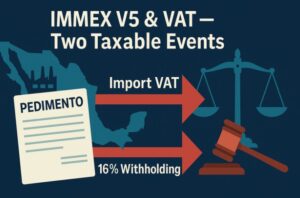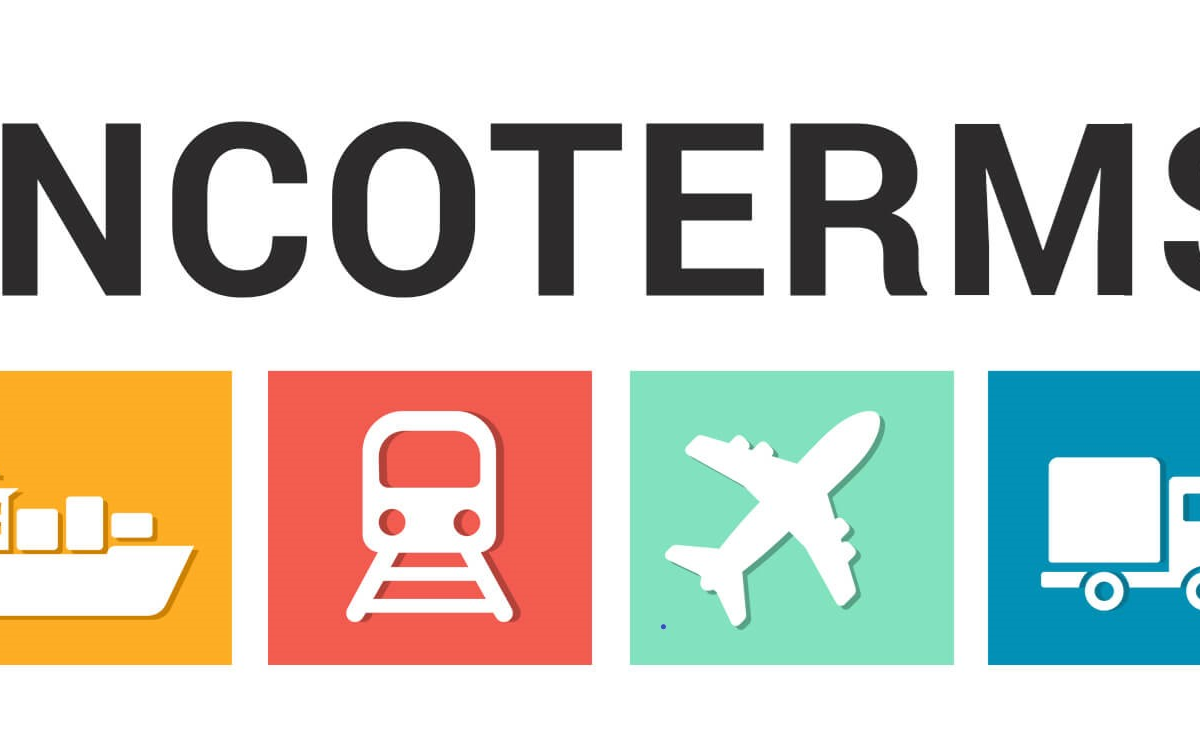
What the Jurisprudence Says
Mexico’s role in the global supply chain will now be going through a dramatic shift. A series of regulatory, legal, and judicial changes are moving the country away from a model of trade facilitation toward one of stricter enforcement and industrial protectionism. This shift presents a new challenge for business, especially those in the IMMEX program and cross-border e-commerce. It’s no longer enough to rely on Mexico’s traditional benefits like low labor costs as companies must now navigate a more complex landscape of higher costs and increased risks.
Who is affected and since when?
In V5 (virtual return) operations, there is a sale in Mexico for VAT purposes. You’ll face an Import VAT at the pedimento and 16% VAT withholding to the foreign supplier (paying 84% to the vendor and remitting 16% to the SAT). This is something called binding jurisprudence. Properly managing credits and refunds prevents “double VAT” from an economic perspective, but it makes cash flow timing critical.
Who is affected and since when?
Immex Maquiladoras and Mexican buyers using V5 with foreign suppliers. Due to this, there will likely be reviews of current and prior periods (requirements, assessments, penalties, and updates.) The requirement to withhold VAT on foreign-supplied goods, in addition to the VAT already paid on their importation, creates a double tax burden. While legally considered separate taxable events, this places a significant financial strain on businesses.
Operational reality for V5
Accounting tracks two VAT buckets; Import and Withheld VAT, later credited against output VAT from local sales and suppliers. Unexpected VAT costs could significantly harm local suppliers’ cash flow, potentially forcing them to renegotiate contracts. This added financial risk to domestic transactions discourages maquila companies from sourcing locally. As a result, companies operating under the IMMEX program might be incentivized to purchase materials directly from abroad, reducing the amount of Mexican content in their supply chains.
Potential Risks in the Field
An incomplete administrative record can lead to significant financial and operational risks. Companies may face assessments for “failure to withhold” VAT, along with substantial surcharges, updates, and penalties that accumulate over multiple years. If these liabilities persist, it could jeopardize their IMMEX/IVA-IEPS certification. These issues often stem from incomplete files, which may be missing crucial documents like the pedimento, withholding payments, CFDI, DIOT, or proper accounting postings. Compliance Checklist: What to Do Immediately
To stay compliant with Mexico’s VAT rules for foreign vendors, companies should implement the following same-day controls:
- Accounts Payable Workflow For V5-flagged foreign suppliers, pay 84% directly to the vendor and remit the remaining 16% to SAT. Never pay the full amount to the supplier.
- Unified Documentation Per Transaction Each operation should be backed by a complete file: foreign invoice, pedimento, withholding payment, CFDI, accounting entry, and DIOT.
- Clean Accounting Entries Separate Import VAT and Withheld VAT in postings to ensure traceability and credit eligibility.
- Contractual Clarity Contracts must include clauses for withholding, gross-up, or net-of-withholding pricing.
- Monthly Dashboards Track V5 detection, withholding payments, and the status of VAT credits or refunds.
Why the Amparo debate matters beyond tax
Companies facing disproportionate or unclear VAT withholding demands can challenge them through an indirect amparo.
When and How to File:
- File against specific acts (e.g., assessments or document requests) or legal norms when harm is imminent.
- Request suspension to pause collections. Be prepared to post a guarantee and maintain formal compliance.
Core Legal Arguments:
- No Actual Double Taxation: VAT credits exist; the issue is timing, not duplication.
- Proportionality: The cash burden is significant, while refunds are often delayed.
- Legal Certainty: Authorities must provide a clear legal basis, applicable period, and scope.
- Evidence-Based Defense: Use pedimentos, withholding records, accounting entries, DIOT, and reconciliations to support your case.
Best Practices to Reduce Risk
- Enforce the 84/16 AP workflow for foreign vendors flagged with V5.
- Maintain indexed files per V5 for quick audits.
- Conduct monthly reviews of VAT credits and refunds.
- Update contracts to reflect withholding and net pricing terms.
- Cross-train teams across accounting, procurement, trade, and legal functions.
What Is Amparo?
Amparo is Mexico’s constitutional legal shield against unlawful government actions. Historically, it allowed judges to suspend laws nationwide while reviewing their constitutionality—a powerful tool for collective protection. A recent reform eliminated “suspension with general effects.” Now, only the individual who wins an amparo receives protection.
Why the Amparo debate matters beyond tax
Think of Amparo as Mexico’s main legal shield protecting human rights against unconstitutional acts or laws. One of its strongest tools used to be “suspension with general effects”—a federal judge could temporarily halt a new law for everyone nationwide while deciding if the law was constitutional. It was an immediate collective safeguard. The recent reform, driven by the ruling party, eliminated that tool. The official argument: judges were overreaching and blocking priority government projects, encroaching on other branches.
Consequences:
- Loss of Collective Shield: No more nationwide pause on potentially harmful laws.
- Justice for the Few: Legal protection favors those who can afford counsel.
- Weakened Checks and Balances: Critics argue the reform undermines judicial oversight.
- Threat to Collective Rights: Environmental, health, and consumer protections are harder to defend quickly.
The Pending Supreme Court Decision:
The reform is being challenged before the Supreme Court (SCJN) via actions of unconstitutionality filed by senators, judges, and civil society. A final ruling is still pending.



